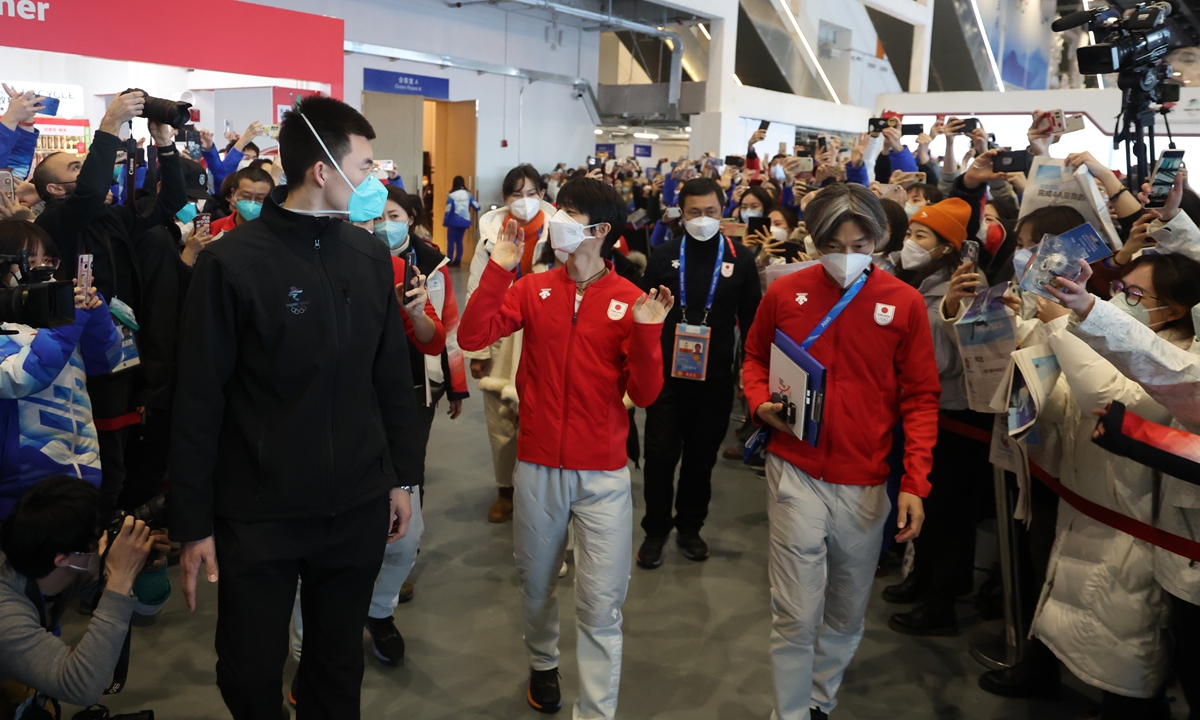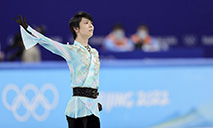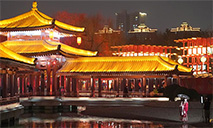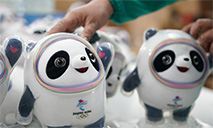Skater Yuzuru Hanyu thanks Chinese fans for support in Beijing 2022, popularity hints 'good start' for worsening ties
Popularity of Japanese athletes a good start for deteriorating bilateral ties

Japanese two-time Olympic champion figure skater Yuzuru Hanyu (center) holds a press conference in Beijing on Monday evening where he took questions from global reporters. Photo: Li Hao/Global Times
Japanese two-time Olympic champion figure skater Yuzuru Hanyu thanked Chinese volunteers and fans at a press conference on Monday during the Beijing 2022 Winter Olympic Games, as millions of Chinese netizens witnessed and encouraged the young athlete who kept chasing his dream and pushing himself to the limit.
Hanyu also said that the ice of the competition venue at Beijing 2022 was very good and he liked it very much. He said he was relaxed and happy, and expressed his gratitude to all.
He noted that he has received more than 20,000 letters from Chinese fans, as well as warm welcomes from volunteers. It's very nice to compete in such an atmosphere with love and welcome from Chinese fans, he said.
When asked whether he will continue to attempt the quad Axel, or "4A," he said he doesn't have an answer yet. He doesn't want to make any excuses. When he did 4A, his ankle was injured and he took anesthesia needle before the final competition, he said.
"I have completed the 4A, although I didn't get a high score, I was satisfied," Hanyu said.
While Chinese athletes used to uphold a "gold medal or nothing" theory, this year's Olympic Games showed Chinese people's simple and sincere love and respect for competitive sports, for which the popularity of Hanyuwith his constant pursuit of 4A can be a perfect reflection.
Yao Jiayue, a skating enthusiast and 10-year fan of Hanyu in Shanghai, said she very much likes Hanyu's artistic skating skills and indomitable character.
"I've been watching Hanyu's performances since high school; I always enjoy the elegant way he skates on the ice and controls the rhythm," Yao told the Global Times on Monday. "His story of overcoming asthma and keeping up with his training and competing inspires me a lot."
Yao believes that the spirit of sports and the Olympics transcend national boundaries. "We appreciate all the great athletes and their excellent performances, no matter whether they are from China, or Japan, or other countries," said the 32-year-old.
Amid the Beijing 2022 event, some media said that Hanyu had replaced retired Japanese table tennis player Ai Fukuhara to become the most popular Japanese athlete in China.
Fukuhara has been popular in China for her fluent in the dialect of Northeastern China. Having spent many years of training in China, she also maintained good relationships with famous Chinese players like Wang Nan and was one of the bridesmaids at the latter's wedding. Chinese people also like Fukuhara as she looks cute but is stubborn in competition.
As China and Japan welcomes the 50th anniversary of the establishment of diplomatic ties this year, observers believe that similar to Fukuhara fever, Hanyu mania is a great opportunity to see easing China-Japan ties, which were strained in the past year mainly due to Japan's frequent military moves with the US in the South China Sea.
After China's best male figure skater Jin Boyang and Hanyu made headlines when they tried to form a heart in front of the cameras after the men's single figure skating competition on Thursday, the Chinese Embassy in Japan posted a short video of their friendly interaction on Twitter, which soon received more than 17,000 likes and nearly 3,000 reposts.
The Embassy told the Global Times on Monday in an exclusive interviewthat the friendly interaction between Jin and Hanyu sparked heated discussion in China and Japan, which fully highlighted the great attention of the two peoples toward the Beijing Olympics and the common love for ice and snow sports.
"As the Beijing Winter Olympics are still underway, we expect athletes from China and Japan to perform at a high level and make new breakthroughs in the Games, and hope the people of the two countries can strengthen mutual understanding and friendship through the Games," the Embassy said.
Besides Hanyu, many other Japanese athletes and journalists have also become popular on Chinese social media due to their excellent performances, friendly behavior and their love for mascot Bing Dwen Dwen.
One photo posted by the International Olympic Committee of some medalists with their golden Bing Dwen Dwen figures on Twitter on Monday has gone viral. It shows Japanese skater Ryoyu Kobayashi, 25, sticking the mascot into the Olympic ring bib that he wore. The IOC tweet reads "So cute you want to put it in your pocket!"
Gido Tsujioka, an announcer from Japan's NTV, earned himself a new nickname "Gido Dwen Dwen" after he became famous on Chinese social media for his wild love for the mascot. Tsujioka told media that he had bought more than 100 souvenirs of Bing Dwen Dwen.
Japanese mogul skier Anri Kawamura, 17, said that she loved the food in the Olympic village. Ice hockey player Sena Suzuki, 30, also spoke highly of anti-epidemic measures in the canteen.
The popularity of these athletes indicate that there is always a friendly atmosphere in people exchanges between China and Japan despite the condition of diplomatic ties, Zhou Yongsheng, a professor in the Institute of International Relations at China Foreign Affairs University, told the Global Times.
This is a good start for the two countries in this year. But after all, if Japan continues to treat China as a threat and follows the US to seek to contain China, it will be difficult for the two countries to embrace a positive change, Zhou noted.
Photos
Related Stories
- China's Olympic COVID-19 bubble works: The Independent
- Wu Dajing: Take every race like last one
- China's Xu Mengtao, Kong Fanyu reach finals in freeski women's aerials at Beijing 2022
- Highlights of ice hockey women's play-off semifinal
- Infographics: World leaders coming for Winter Olympics share views on China
Copyright © 2022 People's Daily Online. All Rights Reserved.










